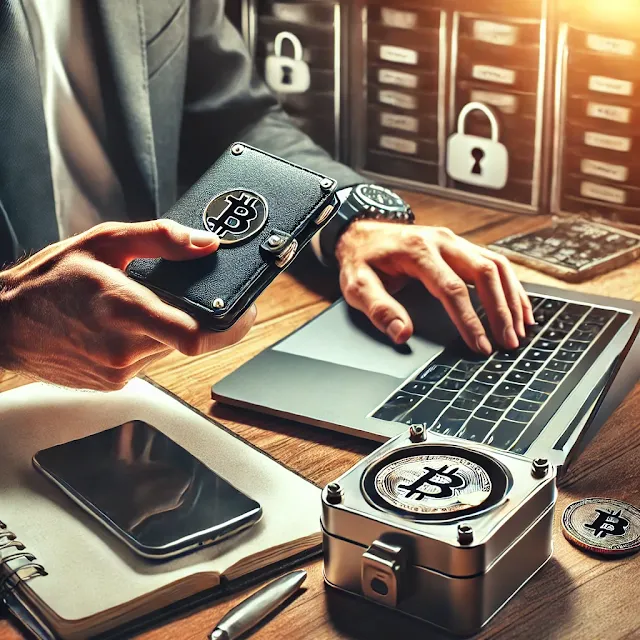Introduction
Cryptocurrency has revolutionized the financial world, offering a decentralized and secure method of transaction and investment. However, with great power comes great responsibility, and safeguarding your digital assets is paramount. Crypto wallets, which store the private keys that grant access to your cryptocurrencies, are the linchpin of this security. Ensuring the security of your crypto wallet is crucial to protecting your investments from theft, fraud, and loss. In this article, we delve into the fundamentals of crypto wallet security, explore different types of wallets, and provide practical tips to help you keep your digital assets safe.
Understanding Crypto Wallets
Crypto wallets come in various forms, each offering different levels of security and convenience. Understanding the types of wallets available and their unique features is the first step toward securing your digital assets.
Key Types of Crypto Wallets
Hardware Wallets: These are physical devices that store your private keys offline, providing robust security against online threats. Examples include Ledger and Trezor.
Software Wallets: These are applications or software programs that store your private keys on your computer or mobile device. Examples include Exodus and Electrum.
Online Wallets: Also known as web wallets, these are hosted by third-party services and accessible via a web browser. While convenient, they are more vulnerable to hacking and phishing attacks. Examples include Coinbase and
Paper Wallets: These are physical documents containing your private and public keys. They are secure against online threats but require careful handling and storage.
Mobile Wallets: These are apps designed for smartphones, providing a balance of security and convenience. Examples include Mycelium and Trust Wallet.
Best Practices for Crypto Wallet Security
Securing your crypto wallet involves a combination of technical measures and prudent practices. Here are some best practices to help you protect your digital assets:
Use Strong Passwords and Two-Factor Authentication (2FA)
Strong Passwords: Choose a strong, unique password for your wallet, combining letters, numbers, and special characters. Avoid using easily guessable information.
Two-Factor Authentication (2FA): Enable 2FA to add an extra layer of security. This requires you to enter a one-time code, typically sent to your mobile device, in addition to your password.
Keep Your Private Keys Secure
Private Key Storage: Never share your private keys with anyone. Store them in a secure location, such as a hardware wallet or a paper wallet stored in a safe place.
Backup: Regularly back up your wallet and private keys. Store backups in multiple secure locations to prevent loss due to hardware failure or theft.
Be Wary of Phishing and Scams
Phishing Attacks: Be cautious of phishing emails and websites that attempt to steal your private keys or login credentials. Always verify the authenticity of websites and emails before entering sensitive information.
Scam Alerts: Stay informed about common scams in the cryptocurrency space. Avoid clicking on suspicious links or downloading unknown attachments.
Use Secure Networks
Public Wi-Fi: Avoid accessing your crypto wallet over public Wi-Fi networks, as they are more susceptible to hacking. Use a secure and private network whenever possible.
VPN: Consider using a Virtual Private Network (VPN) to encrypt your internet connection and protect your online activities from prying eyes.
Choosing the Right Crypto Wallet
Selecting the right crypto wallet depends on your needs, preferences, and the level of security you require. Here are some factors to consider when choosing a crypto wallet:
Security Features
Hardware Wallets: Ideal for long-term storage and large amounts of cryptocurrency due to their offline security features.
Software Wallets: Suitable for frequent transactions and smaller amounts. Ensure the wallet offers strong encryption and security protocols.
Mobile Wallets: Great for on-the-go access and smaller transactions. Look for wallets with biometric authentication and secure PIN protection.
Ease of Use
User Interface: Choose a wallet with a user-friendly interface that makes it easy to manage your cryptocurrencies.
Customer Support: Opt for wallets that offer reliable customer support to assist you with any issues or questions.
Compatibility
Supported Cryptocurrencies: Ensure the wallet supports the specific cryptocurrencies you intend to store and manage.
Cross-Platform Compatibility: If you use multiple devices, choose a wallet that is compatible across different platforms (e.g., desktop, mobile, web).
Advanced Security Measures
For those looking to take their crypto wallet security to the next level, consider implementing advanced security measures:
Multi-Signature Wallets
Multi-Signature (Multi-Sig): Multi-sig wallets require multiple private keys to authorize a transaction. This adds an extra layer of security by requiring multiple approvals, reducing the risk of unauthorized access.
Cold Storage
Cold Storage: Store the majority of your cryptocurrency holdings in cold storage, which refers to keeping your private keys offline. This can be achieved through hardware wallets, paper wallets, or air-gapped computers.
Regular Security Audits
Security Audits: Conduct regular security audits of your wallet and associated devices. Check for vulnerabilities, update software, and ensure your security measures are up to date.
Conclusion
Crypto wallet security is paramount to safeguarding your digital assets and ensuring the long-term success of your cryptocurrency investments. By understanding the different types of wallets, implementing best practices, and considering advanced security measures, you can protect your cryptocurrencies from theft, fraud, and loss. Remember that security is an ongoing process, and staying informed about the latest threats and security practices is essential. By taking a proactive approach to crypto wallet security, you can enjoy the benefits of cryptocurrency with peace of mind.
Disclaimer
The information provided in this article is for general informational purposes only. It is not intended as professional advice and should not be relied upon as such. Always consult with a qualified security expert or financial advisor for personalized recommendations and guidance.

Comments
Post a Comment